Although the snooze button may seem like just what you need on Monday mornings, many sleep experts agree that hitting the snooze button contributes to a tired morning and doesn’t help you feel more rested.
Here’s the scoop on the snooze blues.
Does the snooze button make me sleepier?
- Snoozing can keep you from getting restful sleep during those precious later hours of the night.
- Your body’s natural mechanisms for waking up will get confused and be less helpful.
- Aiming for more consistent sleep is key to avoiding the lure of the snooze button.

After the clock was invented, it wasn’t long before a snooze button was added to give us all a bit more sleep time. Today, snoozing before officially getting out of bed is a pretty standard practice with many folks regularly opting to sleep longer than the alarm allows.
But slamming the snooze button doesn’t always make for a happier morning. In fact, using an alarm clock in general might not be the best idea. To understand why, has to do with the biology of sleep according to research review.
During the sleep cycle, your body alternates between light sleep and deep sleep. When you wake up naturally, your body begins to “reboot” about an hour before your eyes open. Your brain sends signals to release hormones like cortisol and adrenaline, your body temperature rises, and you enter a lighter sleep as you prepare to wake up
So, that alarm beeping (or Lizzo’s “Phone” ringtone) jolts you awake before the natural wake-up process is complete, leading to grogginess that sometimes lasts all morning. And the snooze button could make the situation worse.
Weird but true: Relying on the alarm clock’s snooze button can actually make you more tired.
You know that groggy, disoriented feeling when you wake up? According to a research review, that’s called sleep inertia. A regular sleep cycle when you wake up naturally without a bunch of interruptions will make this phenomenon short-lived.
The same research review above showed that a bunch of factors can contribute to a prolonged version of this disorientation and grogginess:
- sleep deprivation
- shifting sleep schedules
- long, daytime naps (longer than about 20 minutes)
- interrupted sleep, like from snooze button usage
The CDC released a study showing that 1 in 3 adults don’t get their recommended 7+ hours of sleep. That means, many people have the burning temptation for a little extra shut-eye.
Especially after a night of too little sleep, hitting snooze won’t make getting up any easier. Those 5 extra minutes in the morning are much less restful than 5 minutes of uninterrupted deep sleep.
Instead of uninterrupted sleep, snoozing causes sleep disturbances, which can have negative effects on your body, according to a research review. If you find the need to smash that snooze button, it’s probably a sign that you’re not getting enough high quality sleep in general.
Here’s what we’d suggest to help reach that (admittedly, sometimes lofty) goal.
Insomnia, being a new parent, doing shift work… a slew of factors can prevent you from getting a solid 7 to 9 hours of sleep. But there are some ways to get closer to that goal.
Set a realistic wake-up time
Set the alarm for the time you actually get out of bed (i.e. the last snooze) and avoid the snooze button altogether. If keeping those paws off the alarm clock is just too difficult, try placing the alarm clock across the room to force you to get up and move.
Gradually reduce your snoozing
If you’re a die-hard snoozer, try to gradually lower the times you hit the button. If you’re snoozing for 30 minutes, try aiming for 20 minutes for a while. It isn’t perfect, but you’ll be getting 10 more minutes of uninterrupted, restful sleep.
Develop long-term good habits
For a permanent solution to weekday sleepiness, try to cultivate better long-term sleep habits.
- Aim to go to bed and wake up at similar times every day — even on weekends — to establish a regular sleep schedule. your body should begin to start those natural wake-up mechanisms at the time you usually wake, making it much easier to hop out of bed.
- Getting at least 1 hour of sunlight every day can also help synchronize your internal circadian rhythms with the day-night cycle, according to a research review.
- By contrast, limiting that oh so common blue light near the end of the day can help your body prepare for sleep, according to a small study.
- Avoid caffeine later in the day, which can stick around in your body for hours, according to a small 2013 study.
- Avoid long or irregular daytime naps. Quick power naps can sometimes keep you energized, but longer ones can make you sleepier during the day and less tired when you need to be sleeping, according to a small 2012 study.
- Use your daytime hours to get a some physical activity and mitigate stress and anxiety later in the day. A nighttime ritual of meditation or tea without caffeine may help. And watch out for nighttime procrastination.
- Make your bedroom a sleep haven. Limit noise and artificial lights, and maybe take the temperature down a notch so that you can focus on getting those Zzz’s.
Tired of waking up feeling exhausted? Hitting the snooze button may seem like a good idea at 6 a.m., butalarm clocks — and more specifically, snooze buttons — can disrupt the sleep cycle, which leads to less restful sleep.
To get some high quality sleep, try going to bed earlier and aiming for at least 7 hours of sleep each night.

